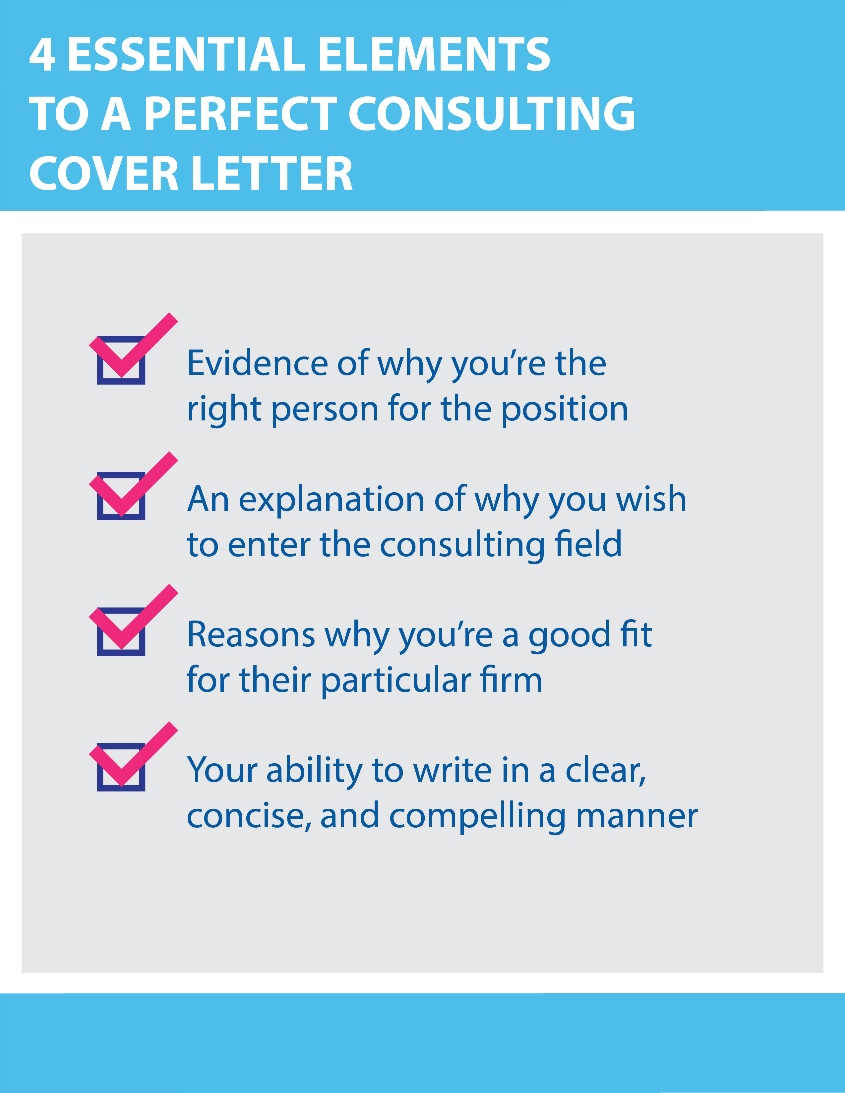FREE Resume Tips Email and Video Series
This form collects your name and email so that we can add you to our email list that delivers the free resources you are requesting. Check out our privacy policy for details on how we protect and manage your submitted data.
We’ll never spam you or share your email. Unsubscribe at any time.
Your cover letter can make a big difference when applying for a management consulting position. Because the cover letter is typically read before your resume, it plays an essential chronological role during the application process.
Consulting firms will typically read your cover letter to quickly identify what makes you different from thousands of other applicants. Therefore, writing a strong and unique cover letter can make you stand out from the competition and ensure that your achievements aren’t overlooked.
A strong cover letter presents an excellent opportunity for you to demonstrate why you’re the best candidate for the job, and to plead your case as to why the firm should hire you over other applicants.
This guide will cover 11 essential steps towards writing the perfect consulting cover letter.
Tip 1 — Know What Consulting Firms Are Looking For
The top consulting firms receive hundreds of thousands of applications each year. For example, McKinsey receives approximately 200,000 applications annually, of which only 2,000 applicants receive an offer. Consulting firms are faced with the arduous task of narrowing down the candidate pool to include only the best.
Interviewing candidates is not a cheap process. The firm wants to ensure that any candidate they interview is qualified for the position, is prepared for management consulting as a career, and is a good fit for the firm.
Therefore, top consulting firms look for four essential elements in a cover letter.
- Evidence of why you’re the right person for the position
- An explanation of why you wish to enter the consulting field
- Reasons why you’re a good fit for their particular firm
- Your ability to write in a clear, concise, and compelling manner

When reading cover letters, screeners will often ask,“Did the applicant spend enough time preparing a strong letter? Have they done their homework regarding the firm and the position in question? Do they have adequate writing skills to prepare compelling emails, reports, and presentations?“
A cover letter is a challenging document to prepare. You may feel worn out after spending hours on your resume, only to realize that you also need to spend as much time (if not more) on your cover letter.
Rather than looking at your consulting cover letter as an annoying extra step, think of it as an excellent opportunity to emphasize your skills and experiences and to set yourself apart from other applicants.
Tip 2 — Make Sure the Letter Has TheseFiveDistinct Sections
While your cover letter doesn’t need to take a formulaic approach, there are five distinct sections that should be covered. They are:
- An Introduction
The introduction should contain which position you’re applying for, your name, address, and contact information. It should also be short, sweet, and entertaining. Write it in such a way that the screener will want to keep reading into the second paragraph.
- Why You’re a Great Candidate
This is the section where you should blow your own horn. Each sentence should speak to your skills, education, and experiences — tying everything back to why you’re a great candidate. Ideally, this section should include your top three achievements to date (relevant to consulting, of course).
- Why Consulting is the Right Fit for You
Remember that the top priority of most consulting firms is to find out whether you’ll become a great consultant if hired. Even with memorable and unique qualifications, a recruiter may not be convinced that these skills will make you a good management consultant. To leave no doubt in their mind, dedicate a section towards explaining why you’re the right person for the job. You can use previous experiences (such as internships, jobs, or academic courses) to tie your career goals to the position in question.
- Why You’re Applying for the Position
The next section should cover why you chose to apply for this exact position in this firm. When laying out your case, identify unique reasons as to why you think McKinsey, Bain, BCG, Deloitte, or any other firm is your firm of choice. To make a compelling argument, identify specific people, reports, or projects that make your story believable. Don’t hesitate to mention specific employees or projects that caught your eye and sparked your interest.
- A Solid Conclusion
Finalize the letter by restating why you believe you’re a great candidate and how you can be of value to the company.
Tip 3 — LinkYour Cover Letter to Your Resume

A consulting cover letter is essentially an opportunity for you to expound on the information you wrote in your resume. What does this mean? It means that your cover letter should highlight the unique achievements, skills, and experiences (relevant to the position) that make you stand out from other applicants.
Your resume and cover letter should work hand in hand to strengthen your application further and demonstrate what makes you stand out.
Start off by identifying what you want the consulting firm to know about you. Draw attention to your career achievements. Maybe you started a business and sold it for a significant profit, or you worked overseas for a few years and have a diverse skillset.
Make sure that unique experiences are mentioned in the first few paragraphs of your cover letter to pique the interest of the resume screener.
Many resume screeners don’t actually read your entire resume.They simply scan it to identify specific items that make you stand out. Because resume screeners scan through hundreds of resumes at a time, they can easily overlook your unique achievements.
The cover letter is your opportunity to prevent this from happening. When you go into detail about achievements in your cover letter, you essentially draw the attention of screeners (and thus give yourself a better chance to land an interview).
Tip 4 — Don’t Forget About Your Resume
Even after referencing the unique skills you have in your cover letter, you need a strong consulting resume to back up your claims. A consulting resume is different from other standard template resumes, as it needs to emphasize a combination of skills that can make you successful as a consultant.
Here are resources that can help you prepare a strong consulting resume. A quality consulting resume will take just as much attention to detail as writing a strong cover letter will. In a nutshell, writing a consulting resume requires you to reflect on your past experiences, select the ones that are most relevant to consulting, and summarize them in a manner that resume screeners can easily scan and digest.
Top consulting firms typically look for the following in your resume:
- Big brand names (employers and schools)
- Strong academic performance (high GPA)
- Strong analytical skills (demonstrated in high standardized test scores)
- Strong leadership and communication skills
- Achievements versus career years (the longer your career is, the more achievements that screeners expect to see)

Also, refer to this resource to identify the top five mistakes that applicants make when writing a consulting resume.
Tip 5 — Avoid Using a Standard Template for Your Cover Letter
It’s no secret that it can be a pain to write a strong cover letter. It takes a lot of time and reflection. You’ll have to revise and edit the piece multiple times before submitting it. But, to truly stand out from other applicants, your letter needs to be interesting, personal, and unique.
The biggest mistake you can make is to copy a standard cover letter template and simply plug in your name and skillset. Screeners hate standard form letters because they’re boring to read, and they show that you’re unwilling to put in the necessary time and effort to write something unique. Because recruiters read thousands of cover letters, they can easily tell when a cover letter is written from a template.
When writing your consulting cover letter, make sure that every sentence is unique. While you may draw inspiration from various templates, add your personal twist to each word and modify it in a manner that emphasizes your unique skillset. For example, instead of starting with the usual format:
“Dear Sir/Madam, I write to apply for a consulting position….”
You can make things more interesting by starting off with what makes you different. Here’s an example:
“After attending Harvard for both my undergraduate and MBA education, I am confident in my ability to become successful as a [insert job position here] at McKinsey.”
Another example:
“My experiences overseas as a Peace Corps volunteer put me in a position to be successful as a [insert job position here] at BCG.”
The idea is to make every sentence in your cover letter count. Add a personal twist to all ofyour skills and experiences and tie them to the job responsibilities of the open position.
Tip 6 — Highlight Your Skills and Experiences via Evidence-Based Storytelling
In your cover letter, the goal should be to tell your story. Rather than simply listing your skills and abilities, demonstrate how various experiences have molded you into the perfect candidate for the position in question. Strive to show that you have what it takes, instead of telling.
For instance, instead of simply stating that you can lead, give a specific example of an experience where you showed leadership qualities. This evidence-based approach shows recruiters that your prior experiences have equipped you with the necessary skills to be successful.
Telling a story makes your cover letter much easier to read. It also makes you stand out from thousands of other applicants who may simply state “I’m a leader,” or, “I’m a hard worker.”
As you use this evidence-based approach, tailor every experience you mention to a specific skillset that is required for the job. If the position requires a candidate with strong interpersonal skills, explain a time when you worked within a team to achieve tangible results. Also, list out any challenges and how you overcame them.
It’s not simply about telling a story. Rather, it’s about telling a story that highlights why you’re a good fit for the job, as well as what makes you stand out from the competition.
Tip 7 — Show Your Value
A common mistake that many applicants make is to only think about personal achievements when applying for consulting positions. Recruiters often read through cover letters that have lots of “me meme” in them.
This is to say that many applicants focus on how they can benefit personally from the position in question, instead of demonstrating how they can become valuable employees (and eventually partners).
Many cover letters talk only about how the candidate will be able to elevate his/her career, experiences, and skills. Such letters only focus on personal goals instead of demonstrating how you can help the company become better. Remember that screeners are looking for candidates who will be of benefit to the firm, not those who are simply using this as an opportunity to enrich themselves and their careers.
When writing your cover letter, emphasize how your skillset will be of benefit to the company. To do this successfully, you need to do your research with regards to what the short-term and long-term goals of the firm are. You can then use these goals and relate them to your unique abilities and experiences.
Tip 8 — One Page Is the Perfect Length
It can be tempting to write a long cover letter, especially if you have a diverse skillset that you feel should be highlighted. However, being concise and keeping it relevant to the position is a much better strategy.
Aim to select only the most relevant experiences that apply directly to the position you’re seeking. You can typically fit these experiences in only one page.
Being concise also makes it easier for recruiters to read through your cover letter quickly without overlooking anything. Edit it down to a concise letter by re-reading and adjusting your original cover letter. The more you read it, the more unnecessary words and content you will find to take out.
Start early so that you can give yourself plenty of time to adjust your cover letter accordingly.
Tip 9 — Be Specific About the Position You’re Applying To
While this may sound obvious, many applicants tend to go off on a tangent about their skills and abilities without first mentioning the job they’re applying for. You should always state the position and office of the job you intend to apply for within the first sentence.
Remember that this information can still be included as you emphasize what makes you different. Here’s an example of an opening sentence that was used earlier in this guide:
“My experiences overseas as a Peace Corps volunteer put me in a position to be successful as a [insert job position here] at BCG.”
Being specific and concise about the job you’re applying for will make it easier for screeners to quickly recognize which position you are interested in.
Tip 10 — Give Yourself Time to Write a Quality Letter
Similar to consulting resumes, writing a strong consulting cover letter takes time. To be successful, you need to consider everything you’ve accomplished as well as what makes you different from everyone else. Don’t think that you can write a strong cover letter in one night. It requires multiple iterations, careful re-reading, and timely feedback.
You also need to make sure that the cover letter blends seamlessly with your resume, and it expounds on the outstanding skills and experiences contained in the resume itself.
Tip 11 — Proofread Thoroughly

And finally, make sure you eliminate any grammatical or spelling mistakes from the final cover letter. These mistakes make you appear careless and can result in being disqualified in the screening process. Don’t let something so simple be your downfall.
Take time to proofread. Ask peers and fellow professionals review your cover letter and give you feedback as well.
Example
Here is an example cover letter that highlights the tips I’ve mentioned. Reference this example as you write your cover letter to make sure that you hit all of the important sections. These items do not necessarily need to appear in the order I have them listed. But, make sure that they are all represented in your cover letter. Below is an example consulting cover letter.
You can also download the example by clicking here.

More Resources:
Free Case Interview Prep Program – Sign Up For Free Instant Access to the Largest Collection of FREE Case Interview Training Resources.
We’ll never spam you or share your email. Unsubscribe at any time.




219 thoughts on “Consulting Cover Letter Tips (and Template)”
Hi Victor,
I have recently completed my Master’s degree in economics, and I would like to enter the world of consulting (Mckinsey, Bcg, etc.). I have no experience in consulting (no work experience).
What should I write in my cover letter to catch the attention of recruiter’s eye?
Thanks a lot.
Alessandro,
If the goal is a top 3 firm and you have no work experience, realistically the GRE, GPA and academic institution need to be extremely good. Assuming you have this, you’d want to lead your cover letter with your “stats” and school name.
-Victor
Hi Victor,
I am trying to access the case interview preparation videos and
1. I am not able to login to the website
2. The link http://www.caseinteriew.com/login does not work
3. The link https://caseinterview.customerhub.net/session does not log us in but rather keeps looping us in without any effect!
Is there an alternate resource where i can access you videos.
Since our Summer Placements are just a month apart and the Consulting firms would be visiting us the first day, it would really help if i can access the resource.
Thanks in advance,
Mohit
Mohit,
We have just checked and currently the login site is working so you may want to try emptying your cache and then try to log back into https://www.caseinterview.com/login or https://caseinterview.customerhub.net.
I’ve been working for 3 years and it seems like they will want to know my GPA either way so I might as well put it on.
I read a piece of advice about cover letters and was wondering what your thoughts were regarding: “NEVER open your letter with Dear Sir or Madam or To Whom It May Concern”. Being specific is ideal, but in large consulting firms, the readers (scanners) of cover letters/resumes could be any of a large number of consultants. Who would you address a cover letter to?
Thanks for all your advice!
-Trevor
Trevor,
If you have a specific contact at the firm, you should address the cover letter to that specific person. If you’re applying more generally, then a dear sir/madam, to whom it may concern is fine.
Unless the salutation is offensive (eg. Dear Sir — there by assuming the decision maker couldn’t possibly be a woman), the salutation is largely ignored. The reader focuses on the first paragraph to see if anything catches his or her eye. If yes, he or she will read the whole letter and resume carefully. If not, he or she will skim the rest of the cover letter and look to the resume.
If the top 20% of the resume looks interesting, the reader will read the whole resume carefully. If the top 20% is not interesting, he or she will skim the rest basically looking for keywords that stand out as interesting.
-Victor
Victor,
Thank you so much, you have been very helpful. I have started my preparations and will apply by Mid-Nov. Except from Vault top 50 rankings, is there any other rankings available for consulting firms
Regards,
Sumedh
I’ve seen other ranking lists online before, but don’t recall their names or website address. They definitely exist.
Victor
Hi Victor,
I am coming from a trader support function at a major bank in Canada. It is much less prestigious than IB. I don’t think I would have a chance at MBB, so I am aiming for the second tiers.
Aside from networking (which I know is probably my best bet), how can I differentiate myself from my competitors through my cover letter to get that interview. I’ve got the brand name of a target school but only 3.3 gpa – I’m also applying as an experienced hire (should I not include GPA since it’s kind of low)
Thanks,
Trevor
Trevor,
For a 2nd tier firm, you might be able to get away with excluding the gpa as an experienced hire provided:
1) you’ve had 5 years of experience… if it’s 2 years, its a little close to graduation, most firms will want to see it.
2) you have say a GRE or GMAT score that is pretty high… you MIGHT get the benefit of the doubt initially… so target school 800 GMAT no gpa on resume good work experience, might be enough to get a first round or to get a courtesy call from a recruiting coordinator to ask for the GPA.
The key is to use test score and work place accomplishment to compensate for missing gpa or low gpa.
I have a video on top 5 resume writing mistakes, located at: https://www.caseinterview.com/consulting-resume , where one of the common mistakes is failing to compensate for weaknesses. The combination of your test scores and work accomplishments needs to be as good as it can possibly be.
Also, in my consulting resume writing toolkit, I have several hours of videos showing me rewriting other people’s resumes. If you happen to have the toolkit, you’ll want to look at those videos carefully and specifically apply the technique I use for writing resume bullets to writing descriptions of your work place accomplishments in your cover letter.
In other words, resume bullet on work experience = cover letter description of work experience.
Toolkit info appears at the bottom of this page:
https://www.caseinterview.com/consulting-resume-video2
-Victor
Victor,
Thanks…yeah I have just registered to become a member. Would want to know when does the recruitment season starts and is it only campus recruitment or people like me who have some experience can also apply and if I can apply then when would be right & best time to apply
Sumedh,
For most firms, there is a definite season for on campus recruiting. It will vary by type of school (e.g., undergrad vs MBA) and full time vs summer internship.
For experienced hires, the process is usually rolling – apply whenever you want. There is no universally best time to apply for experienced hires. However, for start dates big firms may ask you to start when campus hires start – usually summer to early fall (mirroring the start of an academic year). So they might interview you in February, but ask you to start in August — as many internal training programs are organized based on this cycle.
For smaller firms that don’t have a large training instructure and they’ll use experienced hires to recruit for roles where they want someone to start right away.
Victor
Hi Victor,
I have been a investment banking analyst at Citi for past 2 years and would like to shift to consulting. Job at Citi has helped me a lot in number crunching and analytical skills. I am planning to apply at LEK for 2013 intake as I am very much interested in their airline & aerospace consulting. I will be starting my preparations in few days, can you suggest a good starting point as after going through web I found that consulting interviews are way different than IB ones
Sumedh,
You’re correct that IB interviews are very different than the consulting “case” interview. There are two good places to start.
The first are the 6 hour video tutorials available for website members (membership is free). If you are already a member, just go to http://www.caseinteriew.com/login if you are not yet member, you can become one for free by visiting the home page at https://www.caseinterview.com
The second is my book Case Interview Secrets which is a little more current than the videos.
Good luck!
Victor
Hey Victor,
For some reason I cannot access the videos in the back end.
Any tips?
Thanks!
John
Sorry about that. Our membership system is having technical problems. We have an engineering working on fixing it. Nothing to do on your end other than try again tomorrow.
Victor
John – Videos are scheduled to be back on line end of day July 10.
-Victor
Hi Victor,
I have been reading your posts, case interview tips, etc since long and it’s definitely a good read. It’s an eye opener and help us make an informed choice for every organization we are applying and the way we are applying/appearing for the interviews. Appreciation and thankfulness for sharing all your insights, success stories.
Regards,
Mansi
Hello
Excellent information given.Could you pl send me some model cover letter for academic position like business managment professor. and few impressive sample CVs.
Graeful to you
Regards
Raghu
Victor, I have read many book on “how to write cover letter,” but none touch on these important points like you do. Thank you so much for all of your generous help and advice.